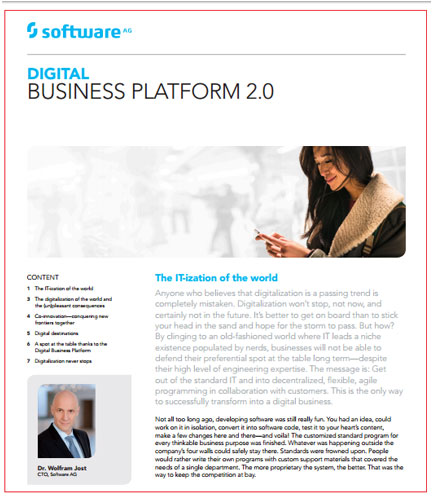
PROCESSING. PLEASE WAIT...


White Paper: Software AG
Digitalization is the road of moving towards digital business and digital transformation, as well as the creation of new digital revenue streams and offerings while doing so. Through digitalization, a company’s digitized resources are transformed into new sources of revenue and operational gains.
Businesses need to develop entirely new processes based on modern software architectures in order to compete in the digital world.
This whitepaper provides insights on how to successfully transform into a digital business.
Key takeaways from this whitepaper:
The digitalization of the world and the (un)pleasant consequences
Digitalization never stops
Five building blocks of Digital Business Platform
By: IDC
ERP systems are the technology backbone of the modern business, and as such, the process of matching the "right" system to specific business needs is extremely critical. Most companies spend quite a bit of scarce resources (time and money) on defining the business requirements and then evaluating the potential systems for a close functional fit and for the potential up-front (implementation and license) costs.
By: Software AG
Digital business transformation is based on an IT architecture transformation with a roadmap for digital capability implementation. Based on the software platforms, digital companies create enhanced or totally new business models which offer completely new digital customer experiences. Established companies are building up software know-how and are acquiring software companies to accelerate their digital transformation by injecting software innovation capabilities into their core business areas. This whitepaper helps to understand what makes today’s digital challengers attractive to customers and consumers, as it highlights their core competencies and differentiators based on their digital software-based technology. Key takeaways from this whitepaper: Digital challengers separate companies from their customers Implementing digital capabilities for digital use cases Digital companies have a micro services-oriented, scalable IT architecture


 2025 All Rights Reserved | by: www.ciowhitepapersreview.com
2025 All Rights Reserved | by: www.ciowhitepapersreview.com